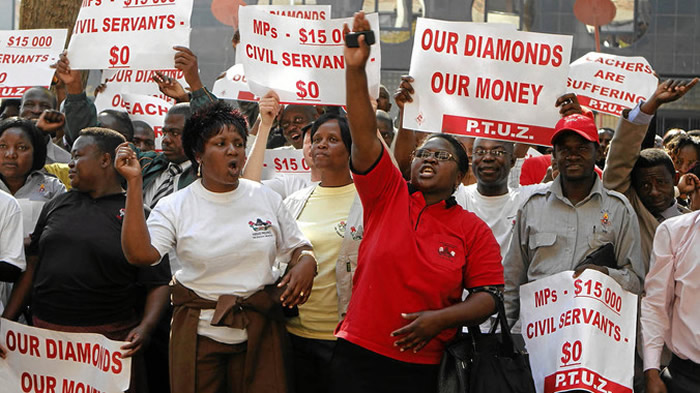By Farayi Machamire
President Robert Mugabe’s stone-broke government is headed for another showdown with restive civil servants who say they are fed up with the preferential treatment that it continues to give to the military.

This comes after the government once again prioritised the military and other uniformed forces in its staggered salary payment schedule for this month, all coming at the expense of teachers, nurses and other long-suffering civil servants.
The Apex Council, a grouping of civil servants’ associations, said yesterday that it felt very strongly that the government was not being even-handed and treating all public servants with the requisite respect that they deserved.
“The Apex Council is and continues to be on record stating unequivocally that this idea where civil servants get their salaries in the next month is not acceptable.
“The economic cycles, especially teachers’ . . . is adversely affected. Banks continue to charge interests on delayed payments, while rentals and other accounts remain in arrears,” its spokesperson George Mushipe said.
“Government should just stick to timelines such that salaries and allowances should be paid in the month of service for all government workers without discrimination whatsoever.”
“We want to continue to urge government to mobilise resources on time, every time. If this trend is allowed to perpetuate unabated, chances are high that December 2016 salaries will come in January 2017,” he added.
Rural Teachers Union of Zimbabwe (RTUZ) president Obert Musaraure was more emphatic, saying that they felt the army was unduly getting preferential treatment.
“Rewarding soldiers is a way of buying loyalty. Civil servants must rise and demand service or the exit of the incumbent regime,” he said ominously.
In new pay dates for October that the State released this week, the military were set to get their salaries yesterday. Health workers will be paid on October 25 while members of the Zimbabwe Republic Police and Correctional Services will get their wages on October 28.
The educational sector will be paid only next month, on November 3, and the rest of the civil service will be paid on November 8.
Hapless pensioners will be paid on November 11, while grant-aided institutions will be the last to be paid, getting their money on November 15.
The broke and ever-bumbling government has been struggling to pay its civil servants in the face of falling revenues and the country’s dying economy.
Last month, Mugabe reversed all the measures that Finance minister Patrick Chinamasa had announced in his mid-term fiscal review statement.
Then, Chinamasa scrapped bonuses for this year and next year for all public workers as part of a raft of austerity measures that included the pending retrenchments of tens of thousands of civil servants and the cutting of salaries of senior government officials.
But not for the first time, Mugabe would have none of this, with his clueless government announcing a few days later that this had all been a cheap beer hall stunt.
“After extensive deliberations, cost cutting measures relating to the civil service were rejected and the position of Cabinet is that the minister of Finance and Economic Development did not take into account the rejection by Cabinet earlier on.
“The President and Cabinet want to assure civil servants, farmers and the public at large that these proposed measures are not friendly operative. It is hoped that this clarification puts to rest anxieties that may have arisen within the civil service, the farming community and the public at large,” it said to the disbelief of the nation.
Mugabe — the only leader Zimbabweans have known since the country gained its independence from Britain in April 1980 — is facing the biggest challenge to his 36 year rule.
The increasingly fail nonagenarian and Zanu PF are battling growing unrest among the country’s restive populace, which blames his government for presiding over the country’s dying economy and the deepening rot in the former regional breadbasket. Daily News






